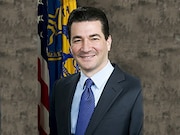Gottlieb’s signature effort has been tighter scrutiny, enforcement of e-cigarette industry
TUESDAY, March 5, 2019 (HealthDay News) — In what probably came as a surprise to many, U.S. Food and Drug Administration Commissioner Scott Gottlieb, M.D., announced his resignation on Tuesday. Gottlieb is leaving the FDA because he wants to spend more time with his wife and three young daughters — twins aged 9 and a 5-year-old — one official said. He currently commutes each week from the family home in Connecticut to his Washington, D.C., office.
He will end his two-year tenure aggressively heading the agency in a month, an administration official told The Washington Post. Gottlieb’s initial appointment by the Trump administration was not greeted warmly by consumer advocates, who pointed to the 46-year-old physician and wealthy venture capitalist’s ties to pharmaceutical companies. But Gottlieb fought hard to safeguard Americans from tough emerging challenges such as youth vaping and the opioid addiction crisis. Unlike the heads of some other major government agencies in the Trump administration, Gottlieb created little controversy and his departure was not sought by the White House, sources told the Post.
Gottlieb’s signature effort at the FDA has been tighter scrutiny and enforcement of the burgeoning electronic cigarette industry, especially its growing hold on children. The agency’s new plan to help curb the spread of youth vaping is under review by the White House. It would greatly curtail the sale of flavored e-cigarettes, which Gottlieb worries will hook a whole new generation on nicotine. In other moves, Gottlieb’s FDA has also sought to ban menthol cigarettes and cut nicotine levels in cigarettes to “minimally addictive” levels.
Gottlieb’s other major accomplishments listed in his resignation letter included speeding approval of generic drugs and revamping the agency’s handling of new genetic and targeted therapies for cancer and other illnesses. Despite strong ties to the drug industry, Gottlieb took a very active regulatory stand when it came to fostering competition and reducing the cost of both brand-name and generic medications.
The Washington Post Article
Copyright © 2019 HealthDay. All rights reserved.








